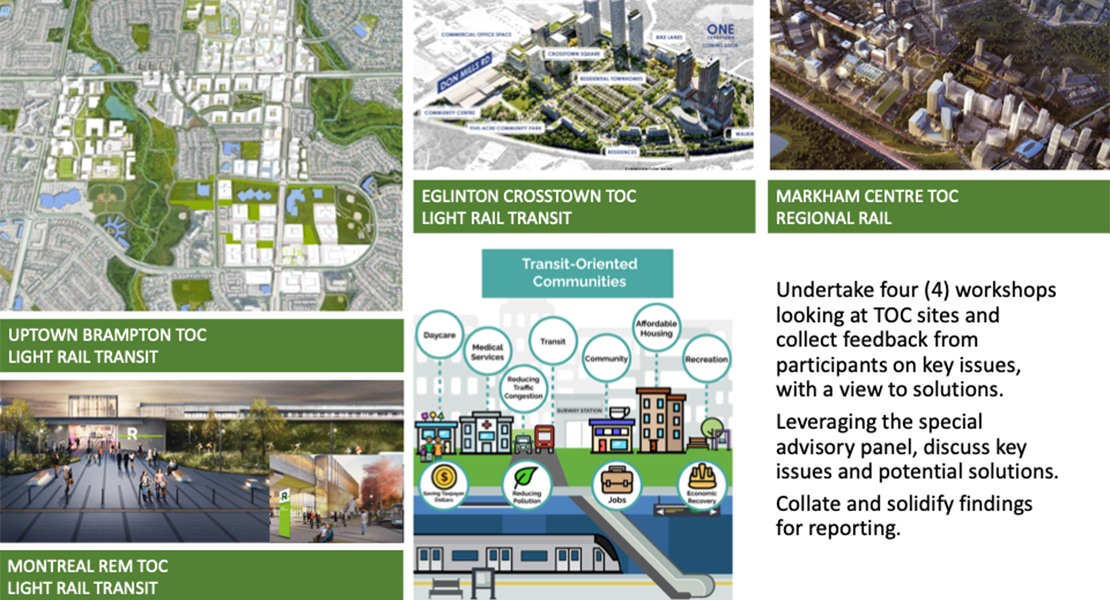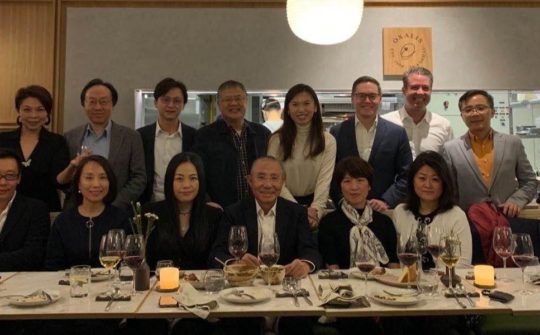In November 2020, ULI launched the Curtis Infrastructure Initiative, a multiyear program to identify and promote infrastructure solutions to create equitable, resilient cities and enhance long-term community value. The Curtis Infrastructure Initiative aims to provide research and practical tools to help ULI members advance infrastructure investment and new solutions to local infrastructure issues, as well as directly support member engagement at the local level through ULI’s 52 district councils.
“We are very excited to be launching this initiative to build a movement to address our complex infrastructure challenges,” said Craig Lewis, chair of the Curtis Infrastructure Initiative Advisory Board. “We are in a moment of time that is facing multiple crises of which infrastructure is the tie that binds us all together. Building globally competitive infrastructure is more than just addressing crumbling roads and bridges. It is also about setting up systems that help us recover from COVID-19, eliminate racial injustice, and are resilient to our changing climate. I am humbled to be chairing such an exemplary board to meet these challenges.”
One of the highest-impact pieces of research to come from this initiative in FY21 was the Broadband and Real Estate report.
Broadband and Real Estate
The initiative’s Broadband and Real Estate: Understanding the Opportunity report makes clear that high-speed internet is no longer a luxury; it is a necessity for participating in society and the economy. The real estate industry can simultaneously combat inequality and boost property values by improving broadband access.
“The COVID-19 pandemic turned the world upside down,” said Lewis. “Virtually overnight, the internet became our primary means of working, attending school, seeking health care, and so much more. Everybody deserves access to the opportunities the internet provides, and this report shows us how we in the real estate community can help make that happen.”
The following are the report’s key findings:
- Broadband is essential. Efficient and equitable broadband is necessary for innovation and the adoption of new technology and uses. Without adequate fiber connections, emerging internet applications in the real estate industry like property technology (proptech), ride sharing, and smart-city technologies are not possible.
- Universal value. Widespread broadband adds value to every sector of society, including the real estate industry, which can expect higher rates of return on projects connected to high-speed internet.
- The digital divide. Policymakers and the industry must address inequities in internet access. Rural communities face a lack of access, and urban communities face a lack of affordability and high quality of services, resulting in “digital redlining.”
- Role of real estate. Developers can lead by using their influence with regional planning authorities and internet service providers both to improve their return on investment and to address the digital divide.
- Don’t get lost in the weeds. Real estate owners and developers do not need to understand every technical detail about connectivity to apply its value to their projects. Connectivity should not be a specialty area, but rather a key part of the development process for all projects.
- Inadequate regulation. The need for high-speed internet is expected to grow in the coming years, and government definitions of acceptable download and upload minimums have not kept up with the needs of the community.
- Understand your need. No single solution exists for addressing the digital divide. Each community will have to identify what works best for it based on its needs. Doing so will aid development of a plan with achievable goals that leverages effective coordination and partnerships.
The full Broadband and Real Estate report is available on ULI’s Knowledge Finder.

The Curtis Infrastructure Initiative partnered with six ULI district councils across North America to provide technical assistance as part of a cohort to help build capacity to reconnect divided communities—physically, socially, and digitally. This cohort of ULI members and staff, local leaders, and other global experts meets regularly over the course of a year to identify key issues, share best practices, and provide updates on projects to support each other in addressing complex infrastructure challenges. The image shows the four workshops undertaken by ULI Toronto to better integrate public transportation investment with community planning.
District Council Infrastructure Grants
In July 2020, the Curtis Infrastructure Initiative asked ULI district councils to submit statements of interests (SOIs) for grants of $15,000 to $25,000 for technical assistance and capacity-building activities on common infrastructure challenges. In response, 31 SOIs were received from 24 district councils in the Americas, including one each from Mexico and Canada. Proposals covered diverse subjects, including increasing access to broadband, building resilience, increasing housing affordability, and developing equitable frameworks for infrastructure investment. Six projects from across North America were selected to form a cohort to help build capacity to reconnect divided communities—physically, socially, and digitally. Funds were dispersed in FY21, when nearly all the major project activities occurred. Final reports will be completed in FY22.
Baton Rouge, Louisiana
ULI Louisiana convened a technical assistance panel in the Baton Rouge’s Plank Road corridor to identify opportunities for free or reduced-cost internet access. This would build on efforts by the city to implement the recommendations in the Imagine Plank Road small area plan as well as support construction of the region’s first bus rapid transit line.
- Award: $20,000
- Partners: Build Baton Rouge, Baton Rouge Planning Commission, Capital Region Planning Commission, Louisiana Department of Environmental Quality, Louisiana Office of Broadband and Connectivity, Louisiana State University’s Real Estate Research Institute
- Final report: Baton Rouge Plank Road technical assistance panel report, expected fall 2021
- Impact: ULI Louisiana and the Curtis Infrastructure Initiative are positioned as policy leaders on statewide broadband implementation and to expand Baton Rouge activities; background research for the symposium was the basis for the Broadband and Real Estate report.
Cincinnati, Ohio
ULI Cincinnati conducted six workshops to accelerate the proposed 34-mile urban trail loop, called CROWN, to improve equity and development of affordable housing in underserved areas. The district council and partner TriState Trails sees completion of this trail and the access it will provide as an opportunity to improve global competitiveness and economic mobility.
- Award: $20,000
- Partners: Mill Creek Alliance, Ohio River Trail West, Working in Neighborhoods, Community Learning Center Initiative, Price Hill Will, The Port, Green Umbrella, Tri-State Trails/CROWN, Ohio River Way, Wasson Way
- Final report: CROWN Trail Action Plan report, expected fall 2021
- Impact: The project was named one of the top five transformative efforts by Cincinnati Business Courier; ongoing workshop activities have enabled ULI Cincinnati to engage the mayor.
Fort Worth, Texas
ULI Dallas–Fort Worth conducted a technical assistance panel to recommend infrastructure priorities in Fort Worth’s historically Black Stop Six neighborhood as part of the city’s match for a significant grant from the U.S. Department of Housing and Urban Development (HUD). The project will involve civic leaders and community voices in determining the best way to allocate the local funds for infrastructure to support equitable investment.
- Award: $20,000
- Partners: City of Fort Worth (City Council, Housing, Planning, and Transportation), HUD
- Final report: Stop Six technical assistance report, expected fall 2021
- Impact: The city approved $2.9 million to implement key ULI recommendations enabling the $35 million HUD grant to be awarded. This supports a $345 million affordable housing development as well as other neighborhood transformation efforts. Phase one broke ground in September 2021.
St. Paul, Minnesota
ULI Minnesota worked with ReConnect Rondo and the Minnesota Department of Transportation (MnDOT) to hold a series of workshops to identify policies, financial models, and community benefit principles through a public/private/partnership/people (P4) model that would result from the development of the Rondo Community Land Bridge capping Interstate 94. (Click here for the June presentation day of community-workshopped ideas.)
- Award: $25,000, plus a $10,000 Building Healthy Places implementation grant
- Partners: ReConnect Rondo, City of St. Paul, St. Paul Port Authority, Hack the Gap, Ramsey County, Metropolitan Council, MnDOT
- Final report: Rondo, St. Paul people/public/private/partnership (P4) model report, expected fall 2021.
- Impact: ULI continues to be seen as a crucial partner in implementing the nationally significant project. The state has appropriated $6.9 million based on previous ULI recommendations; federal appropriations may support additional engagement activities.
San Antonio, Texas
ULI San Antonio convened a task force to explore innovative and equitable mobility services to maximize transportation tax revenue, reduce vehicle-miles traveled and expand first- and last-mile solutions in the VIA Metropolitan Transit system. This includes the goal to provide better access to education across the city and region. Twelve sites were identified as good candidates for the first phase of publicly funded hub locations.
- Award: $25,000
- Partners: New Urban Mobility Alliance (NUMO), VIA Metropolitan Transit, City of San Antonio, University of Texas at San Antonio, National Resources Defense Council, Hemisfair
- Final report: Mobility Hubs in San Antonio: A Path to Equity and Sustainability, expected fall 2021
- Impact: Efforts are aligning citywide on creating equitable transportation planning that integrates new technologies. An ongoing process has been adopted for use by the city and regional transit agency as well as for an overall electric vehicle charging network. The effort was identified by the Federal Transit Administration as a best example of leveraging partnerships in its America’s Open and Transit’s Open report. Also, two private real estate development companies plan to integrate mobility hubs into their developments, broadening the network.
Toronto, Ontario
ULI Toronto conducted four workshops to identify best practices to reinvent underperforming suburban and urban areas in health-promoting and affordable ways by creating 20-minute walkable neighborhoods with community hubs. This work will help advance efforts to foster communities that promote health, improved competitiveness, and a high quality of life, and move the Greater Golden Horseshoe region to achieve carbon neutrality in innovative, inclusive, and affordable ways.
- Award: $20,000
- Partners: Metrolinx, University of Toronto, City of Brampton, City of Toronto, City of Markham, Province of Ontario
- Final report: Getting to Transit-Oriented Communities, expected fall 2021
- Impact: The region is rethinking how to leverage an already successful public/private partnership approach to bring more placemaking and successful suburban development to the region. Plans are being developed to bring some of the community hub recommendations to fruition in Brampton, Ontario.
An additional grant was provided to ULI Philadelphia to support a Delaware Valley Regional Planning Commission (DVRPC) and Temple University partnership. The DVRPC partnered with ULI Philadelphia to advise graduate students from the Temple University Master of Public Policy and Master of City and Regional Planning programs. The students conducted a study assessing the impact of major transportation projects on minority and low-income communities in southeastern Pennsylvania and southern New Jersey and provided policy recommendations on how to obtain more equitable outcomes in transportation planning in the future. This was funded as a supplemental district council infrastructure grant. (Click here for a link to the report and the June 2021 ULI Philadelphia webinar.)earn more about the Curtis Infrastructure Initiative here, or contact [email protected].


